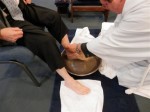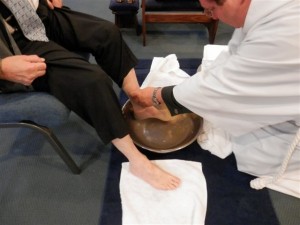It is popular to talk about living balanced. Everywhere you turn, people are talking about the balanced life.
We need to have balanced diets, balanced budgets, balanced work life, balanced emotions, and balanced families.
I am not opposed to any of that, I suppose, but recently I have begun to wonder if our lives as followers of Jesus are supposed to balanced?
 I suspect not.
I suspect not.
There are a couple things that got me thinking about this.
The Unbalanced Life
The first thing that got me thinking about the unbalanced life is my own life as a follower of Jesus, especially in comparison to my wife’s life as a follower of Jesus. My wife, Wendy, is a lover and a server. I am a thinker and a reader.
For many years in our marriage, my wife felt guilty that she did not spend as much time “in the Word” and reading theology as I did. I, on the other hand, always felt guilty that I did not spend enough time getting to know our neighbors, taking baked-goods over to friends, or playing with children down at the park the way my wife did.
But recently, we have both come to the realization that God made us who we are, and rather than fight who God made us to be, we must revel in it.
Wendy shines when we have people over to our house. She almost literally glows, especially when the company includes children. She is specially gifted by God to love and serve others with her whole being. She bakes, cooks, talks, serves, and loves people in a way I have never seen matched by anybody.
When there are people in our house, especially when they are young people, visible light and energy almost radiate from my wife.
I, on the other hand, can sit for hours with my nose in a pile of books, chasing down insights into various Greek words, information about the historical background of a biblical event, and ideas about how to understand a particular text.
Wendy looks at me and says, “How can you sit and study so long?” I look at her and say, “How can you love to bake and entertain children so often?”
If someone told Wendy that she needs to “be more balanced” and spend less time cooking and with children and more time reading books, she wouldn’t do so well. She likes to read, but she prefers to be with people.
If, on the other hand, someone told me that I need to “be more balanced” and spend less time thinking and studying and more time talking with others, I wouldn’t so well. I like to talk with people, play with kids, and cook the occasional … hot dog … but all the while, my mind will be on the ideas and insights that are running through my head.
Neither one of us lives “balanced” very well, and I am beginning to think that maybe we are not supposed to.
Don’t Live the Balanced Life
God made us who we are, and we need to embrace our giftings, interests, desires, and abilities, and throw caution to the wind, flinging ourselves into these full-bore, with wild abandon.
Of course, since we are married, I will be helping Wendy cook and clean and enjoying many conversations with friends and neighbors. And Wendy will be hearing some of my ideas and insights into Scripture as we discuss what is going on inside my head.
So as different as we are, we need each other, and we help each other do things that we could not do on our own.
 I need her to lead me in practical ways to put my ideas into practice, and she needs me to help theologically affirm and encourage her actions in loving others.
I need her to lead me in practical ways to put my ideas into practice, and she needs me to help theologically affirm and encourage her actions in loving others.
Ironically, my wife (the lover) is the one who helped me (the thinker) see and understand this. For my entire life, I have always been … how can I say it? … more comfortable in a book than in a crowd. It is not that I mind crowds; it is just that they wear me out. Quickly. Books and thinking, however, invigorate and excite me. I am an internal person. Much of my life takes place inside my head.
For a long time, I used to feel guilty about this. I used to think that a “true” follower of Jesus, an “on-fire” Christian, a passionate disciple, would be out volunteering at the soup-kitchen, chatting with the neighbors about tomato-growing tips, and learning the names of the children down at the local park. I used to think that a “true” follower of Jesus would go about with a spirit and attitude of prayer and grace as they spend their days washing, serving, scrubbing, praying, befriending, and talking.
That was never me. Not ever.
I tried.
As a pastor, I tried.
As a seminarian, I tried.
Having left seminary, I tried.
In my current place of work, I tried.
Part of the difficulty is that my wife was so good at all these things. Within a week of moving into a new neighborhood, she has taken fresh-baked loaves of bread and cookies to our neighbors and has had hour-long conversations with all of them, learning about their dogs, their jobs, and their children.
Me? When I talk to the neighbors, I can barely talk about anything more than the weather. I fear going to get the mail, because I am afraid I will meet a neighbor and forget their name or what we talked about last week. I dread running into a coworker at Wal-Mart because I will probably forget their name or not know what to say.
If Wendy goes to the local park, she will have a crowd of children around her in ten minutes, all of them laughing, cheering, and giggling. In a few minutes more, she will know their names. She will know their dog’s names. They even ask her when she is coming back to the park. I call her a modern-day Pied Piper (but in a good way).
Me? I sometimes think I scare kids. I am pretty sure I scare their parents. Last time I tried to talk to a kid in the park, I didn’t get through half a sentence before the parents yelled out, “OK, Tommy, time to go home!” I am not making this up.
When Wendy stands in line at the Supermarket, people just talk to her about things. She sometimes strikes up conversations with them, but more often than not, they start conversations with her.
Me? Nobody ever starts a conversation with me. I have tried to start a conversation with others, and they usually look at me like I’m some sort of freak. I mean, who talks to strangers these days?
I discovered though, that my wife often felt guilty for not spending more time reading and studying books. She saw me doing this, and despite how easily she could talk with people and build relationships with them, she often felt that she wasn’t spending enough time “in the Word” or reading theology. She went to Bible college too, and she was taught (along with the rest of us) that “disciple” means “student, pupil, learner” and so she always thought that if she was a fully-committed disciple, she needed to be studying and learning.
Recently, though she has realized (and I concur) that both of us are who God made us to be. We need to accept who God made us, and rather than fight it, revel in it.
It is like Eric Liddell saying, “I believe God made me for a purpose, but he also made me fast. And when I run I feel His pleasure.” My wife feels God’s pleasure when she bakes for other people, plays with children, ministers to the neighbor, and laughs with friends. Me? I feel God’s pleasure when I discover something new about a certain Greek word in Luke 4:18 which I can then share with others through teaching or writing.
My wife is not me, and she shouldn’t try to be me. Similarly, I am not my wife, and shouldn’t try to be her. Yet we both need each other. I do the studying for her and she learns from me. She does the love and service and helps me make friends and love others in ways I could never do on my own.
This is a long and roundabout way of saying this:
It’s the same with the church.
Rather than a bunch of clones running around who all look, act, and talk like the pastor, each person is to be as fully themselves as they can possibly be. Only then does the Body of Christ develop in healthy and beautiful ways.
If we can talk about “biblical balance” it is not found so much in the lives of individual Christians, but rather in our ability to let others be who God made them to be while we seek to be who God made us to be. We must be who we are while rejoicing in who others are. I must not expect others to tirelessly read and study, and they must not expect me to be invigorated by baking a cake or listening to our neighbor talk about his dog.
What would the church be like if everybody just loved and served others, and nobody studied or learned? Well, for one thing, we wouldn’t have any English translations of the Bible. In fact, we wouldn’t have any Bible at all, for the work of writing and transmitting the Bible through the centuries was painstakingly carried out by committed and dedicated scholars.
But think what Christianity would be like if everybody was a scholar, and nobody loved or served? If that were the case, Christianity would have become just another philosophy and probably would not have lasted more than a century or two before it was replaced by something else.
So the truth is that we need each other. The hands-on Christians keep Christianity moving forward (usually). The heads-on Christians keep us moving in the right direction (mostly).
Where is the balance? There is no balance. Forget about balance. Don’t try to be balanced. Know you are are, and who God made you to be, and run after that with all your energy. Be the best “You” that you can be, for you cannot be anyone else, and nobody else can be “You” either.
God created you to do something, so go do it! Don’t turn to the left or the right by pious-sounding talk about “balance.”
Find your divine spark of “madness” and fully embrace it until it turns into a raging inferno. Then people will come from miles away just to watch you burn.
The beauty of Christianity is not that we are all the same or that we are all “balanced,” but instead, that we are all so dissimilar and opposite, and that in Christ, we are unified and can celebrate the differences and insanities of others rather than calling them to “become like us.”
What is your particular insanity?
Did you know you are insane? Yes. And it’s a good thing. Embrace it. Enjoy it. Live it.
 If you are not sure where your particular insanity lies, ask yourself what causes people to look at you and say, “Try to be more balanced”?
If you are not sure where your particular insanity lies, ask yourself what causes people to look at you and say, “Try to be more balanced”?
In this post, I have only talked about loving others (my wife) and studying books (me), but I imagine there are other passions and interests that some of you might have. What are they? How can you fling yourself into these whole-heartedly for your own personal satisfaction and ultimately for the glory of God?
Possible Ways to Live the UN-Balanced Christian Life
Here is a list of possible areas that you can pour yourself into wholeheartedly without expecting all other Christians to do the same: (Note: you might have more than one area. That’s fine!)
- Loving your friends and neighbors (like my wife)
- Taking care of children
- Cooking, baking, and hospitality
- Ministry to prostitutes
- Loving the homeless
- Serving the elderly
- Conservation of nature
- Caring for animals
- Political activism
- Studying and Teaching Scripture
- Learning and researching theology
- Helping others live a healthy life
- Financial stewardship
This, obviously, is not a comprehensive list. But as you let God make you more like the “you” that you were meant to be, He will show you your particular “insanity,” the are of special madness that nobody else can replicate because it belongs to you alone.

Does God want us to live a balanced life? I am not so sure. God made each of us insanely unique, so maybe He want us to reveal in our insanity.
Do you know what your madness is? Have you embraced it? Share in the comments below!




 I deal with men who are mentally ill on a weekly basis at my job. Recently, a young man named Daniel came into my office and said he had a message for me from God. He handed me a note, which said this:
I deal with men who are mentally ill on a weekly basis at my job. Recently, a young man named Daniel came into my office and said he had a message for me from God. He handed me a note, which said this: Does a modern foot washing ceremony do this? Hardly. More often than not, people who attend these foot washing ceremonies make sure that they washed their feet in advance and scraped all the gunk out of their toenails. Then they wear a clean pair of socks and shoes.
Does a modern foot washing ceremony do this? Hardly. More often than not, people who attend these foot washing ceremonies make sure that they washed their feet in advance and scraped all the gunk out of their toenails. Then they wear a clean pair of socks and shoes.




 The radio show host said that though he had been there all morning helping to prepare the food and the auditorium for feeding the homeless, he hadn’t seen any of the “Models for Christ” do any work earlier. During the picture shoot, all they did was smile, post, and hold paper plates full of food that someone else had prepared. Then, when the photo shoot was over, all the “Models for Christ” left… without serving a single plate to a single homeless person.
The radio show host said that though he had been there all morning helping to prepare the food and the auditorium for feeding the homeless, he hadn’t seen any of the “Models for Christ” do any work earlier. During the picture shoot, all they did was smile, post, and hold paper plates full of food that someone else had prepared. Then, when the photo shoot was over, all the “Models for Christ” left… without serving a single plate to a single homeless person.